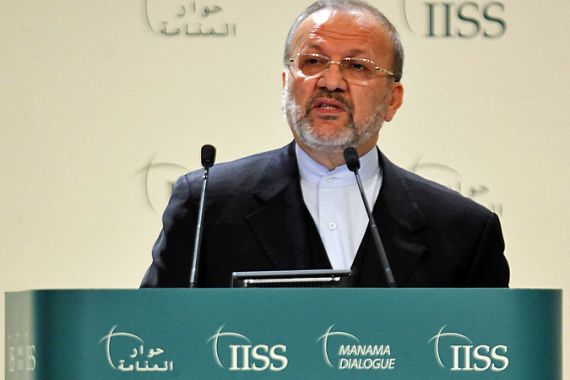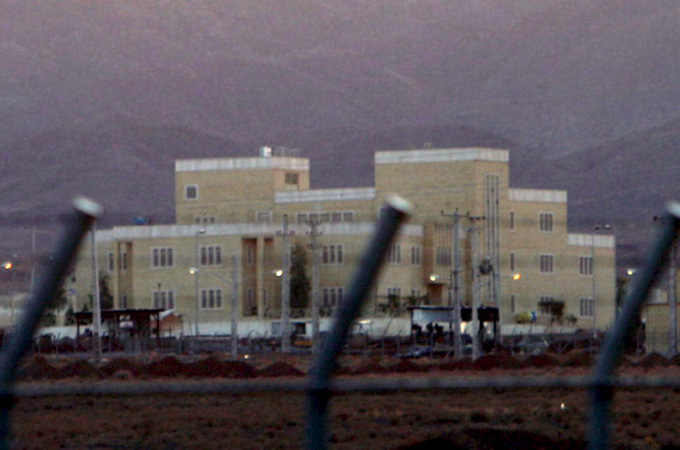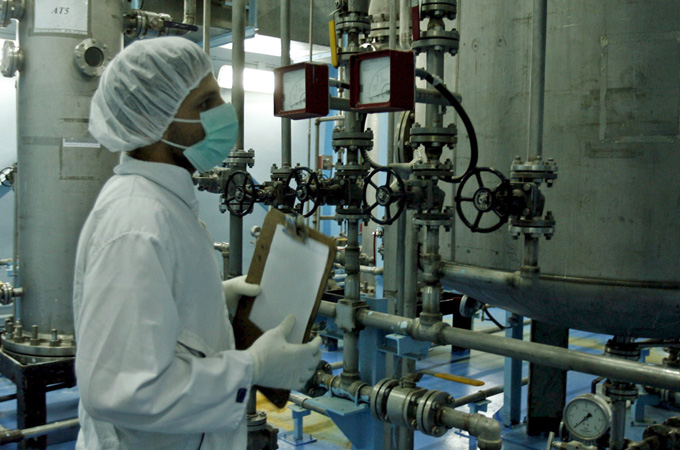Iran seeks to calm Gulf fears
Iran’s foreign minister tells Gulf Arab states that they should not be concerned over the country’s nuclear programme.

 |
| Iran told Gulf Arab states it was not a threat and wanted co-operation, in an apparent attempt to lower tensions [EPA] |
Iran has sought to calm its neighbours’ fears over its nuclear programme, saying it would never use force against them because they are Muslims.
The publication of leaked US diplomatic cables earlier this week revealed that Gulf Arab leaders are deeply anxious about Tehran’s nuclear ambitions.
But speaking on Saturday, just two days before Iran is to sit down with world powers in Geneva, Switzerland, to discuss its uranium enrichment programme, Manouchehr Mottaki, the Iranian foreign minister, said leaders of other countries on the region have nothing to fear.
“Our power in the region is your power and your power in the region is our power,” Mottaki told the Manama Dialogue, a security conference in Bahrain.
“Our growth will only pave the way for others to grow.”
‘No suspicion’
Mottaki’s speech did not mention the publication by the WikiLeaks website of the embassy cables, which included several quoting Arab leaders expressing strong opposition to the possibility of Iran acquiring nuclear weapons.
| Special Coverage | |||
|
“We must not allow Western media to tell us what we think of one another …. We have never used our potential to become powerful against any neighbours especially because our neighbours are Muslims,” Mottaki said.
“There should be no suspicion or ambition by one country over another because that would undermine efforts to establish co-operation,” he said in a speech to an audience including Gulf Arab officials and ministers.
“We have never used our force against our neighbours and never will because our neighbours are Muslims.”
One notable Wikileaks document cited King Abdullah of Saudi Arabia as urging the United States to attack Iran’s nuclear installations.
He was reported to have advised Washington to “cut off the head of the snake” while there was still time.
The leaked cables underlined the depth of suspicion of Shia Muslim Iran amongst Sunni Arab leaders in the Gulf region.
‘Unhealthy rivalries’
Mottaki said Iran’s neighbours should not submit to pressures from outsiders who have stoked “unhealthy rivalries” and weakened the region’s drive for self-sufficiency. He also stressed that the region had nothing to fear from Iran’s nuclear energy development.
Monday’s talks in Geneva are the first since October 2009 on the nuclear programme, but Iran has made clear it will not negotiate its “nuclear rights”, referring to its uranium enrichment activities, which the West suspects are aimed at developing an atomic arsenal.
 |
| Iran has made clear it will not negotiate away its ‘nuclear rights’ during talks in Geneva on Monday [EPA] |
The powers – the United States, Russia, China, France, Britain and Germany – want Iran to halt enrichment, which Tehran says is for purely peaceful civilian energy purposes.
In Tehran, Iran’s chief nuclear negotiator said he welcomed next week’s talks as a way to start improving relations.
Saeed Jalili said the new sanctions imposed on Iran since similar talks in October 2009 had proved ineffective and called on the other parties to stop putting pressure on the Islamic Republic through punitive measures.
Giving concrete details about Gulf Arab achievements that Iran supported, Mottaki said Tehran was happy to see Gulf Arab nations discussing economic co-operation among themselves.
“We are happy when we see women enter parliaments in Kuwait and Bahrain, and when the petrochemical industry in Saudi Arabia has become very advanced in the world, and when Bahrain becomes a banking centre,” he said.
” We are happy to see the balances of Arab countries reach two trillion dollars and that Iraq is nearing stability and the oil industry is flourishing.”
Mottaki said that in recent days on visits around the Gulf he had been told how officials wanted to deepen ties with Iran.
